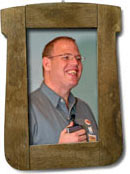Attributed to Paul Harvey?
Anna
May Jarvis, quote: "Mother's Day has nothing to do with candy. Candy is
junk. You give your mother a box of candy and then go home and eat most
of it yourself...."
Anna May Jarvis, quote:
"A
maudlin, insincere printed card or a ready-made telegram means nothing
except that you're too lazy to write to the woman who has done more for
you than anyone else in the world. You ought to go home and see your
mother on Mother's Day. You ought to take her out and paint the town
red...."
Anna May Jarvis, still quoting now:
"You
ought to give her something useful, something permanent. A lot of
mothers are sleeping on mattresses that are as hard as rocks. Maybe she
needs new eyeglasses, comfortable shoes, a pair of slippers, or better
lighting fixtures. Is she sleeping warm at night? Could she use an
eiderdown? Maybe the stairs in her home need fixing. . ."
What about flowers, Anna May?
"Flowers are about half dead by the time they're delivered."
"Flowers are about half dead by the time they're delivered."
And
Anna May goes on to say that she won't rest "until Mother's Day becomes
the personal family Memorial Day it was intended to be."
If
anyone had the right to speak out against the commercialization of
Mother's Day, it was Anna May Jarvis. That second Sunday of
thoughtfulness each and every May was Anna's idea in the first place.
Anna May Jarvis was the Mother of Mother's Day. Anna May Jarvis, born
May 1, 1864.
She
was a minister's daughter, described as a quiet, studious girl in
school who liked everyone and whom everyone liked. Anna was just two
weeks forty-two, working for a life insurance company in Philadelphia,
when her mother died on the second Sunday of May, 1906. Friends noticed a
change in Anna in the months following that unhappy occasion. No longer
the gentle, easygoing woman they knew, Anna became obsessed with but
one desire: to see her mother and motherhood honored annually throughout
the world. After more than a year of careful planning, Anna arranged
the first Mother's Day church service-May 10, 1908-at St. Andrew's
Methodist Church in Grafton, West Virginia, where Anna's mother had
taught Sunday school. Anna worked hard to promote her idea. A year after
that first memorial service in West Virginia, Philadelphia became the
first city to proclaim an official Mother's Day. Three years passed.
West Virginia made Mother's Day a statewide observance. One year later,
in 1914, President Woodrow Wilson signed a proclamation from Congress-a
document recorded as Public Resolution 25-to establish the second Sunday
in May as Mother's Day forevermore.
And
it had all begun with Anna. But Anna, now fifty years old, was not
content with her victory. She retired from her job at the insurance
company to spend her remaining thirty-four years, and her entire fortune
of over a hundred thousand dollars, campaigning against the
commercialization of the day she had founded in honor of motherhood. She
interrupted florists' conventions to express her remorse at their
"profiteering"; wherever there was a forum for her cause, she spoke out.
Then one day, when she was too old and too tired to speak out, she was
placed penniless, deaf and blind in a West Chester, Pennsylvania,
sanitarium. She died there in November of 1948; she was eightyfour.
And
if the story of the woman who invented Mother's Day is made even more
poignant, it is by the fact that she, Anna, would never benefit from
that time of remembrance. For Anna May Jarvis-the Mother of Mother's
Day, who devoted her life and her fortune to its reverent observance-was
never married and was never a mother.
For More Parent Ministry Ideas, Visit us on Parent Ministry Resources

No comments:
Post a Comment